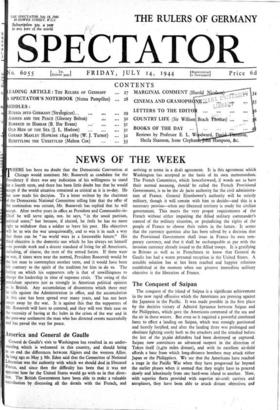NEWS OF THE WEEK
HERE has been no doubt that the Democratic Convention at Chicago would nominate Mr. Roosevelt as candidate for the residency if there was any indication of his willingness to stand or a fourth term, and there has been little doubt but that he would ccept if the world situation remained as critical as it is to-day. He as now made his decision. To a letter written by the chairman f the Democratic National Committee telling him that the offer of he nomination was certain, Mr. Roosevelt has replied that he will ccept. After twelve years in office as President and Commander-in- hief he will serve again, not, he says, "in the usual partisan, political sense," but because, if elected, he feels he has no more ight to withdraw than a soldier to leave his post. His objectives will be to win the war unequivocally, and to win it in such a way that there can be "no world wars in a foreseeable future." His third objective is the domestic one which he has always set himself —to provide work and a decent standard of living for all Americans, including, of course, the men of the armed forces. If there were no war, if times were near the normal, President Roosevelt would be the last man to contemplate another term, and it would have been felt contrary to the spirit of the tradition for him to do so. The feeling on which his supporters rely is that of unwillingness to change the leadership in time of supreme crisis. The swing of the pendulum operates just as strongly in American political opinion as in British. Any accumulation of discontents which there may be tells against the Administration in office, and the accumulation in this case has been spread over many years, and has not been swept away by the war. It is against this that the supporters of Mr. Roosevelt will have to contend, and they will rest their case on the necessity of having at the helm in the crises of the war and in the post-war settlement the man who has directed events successfully and has paved the way for peace.


























